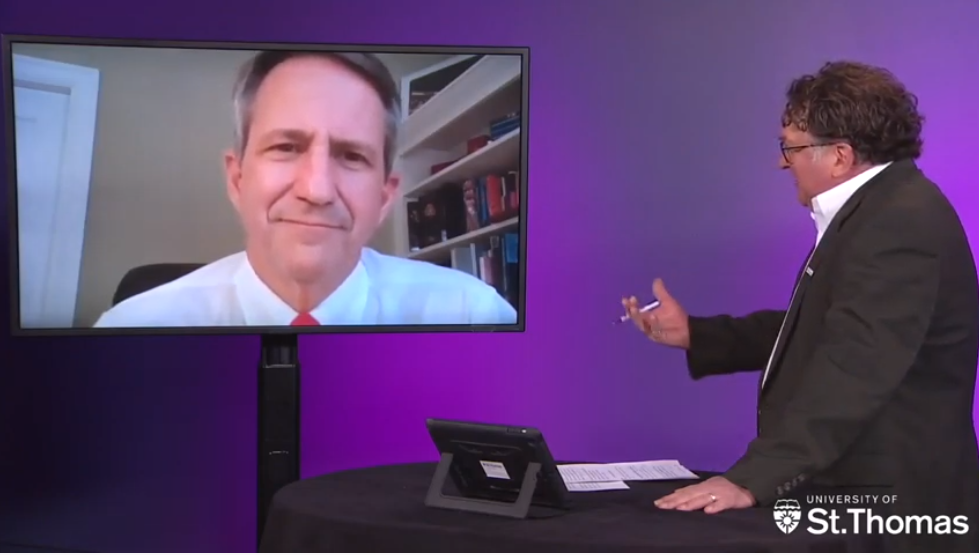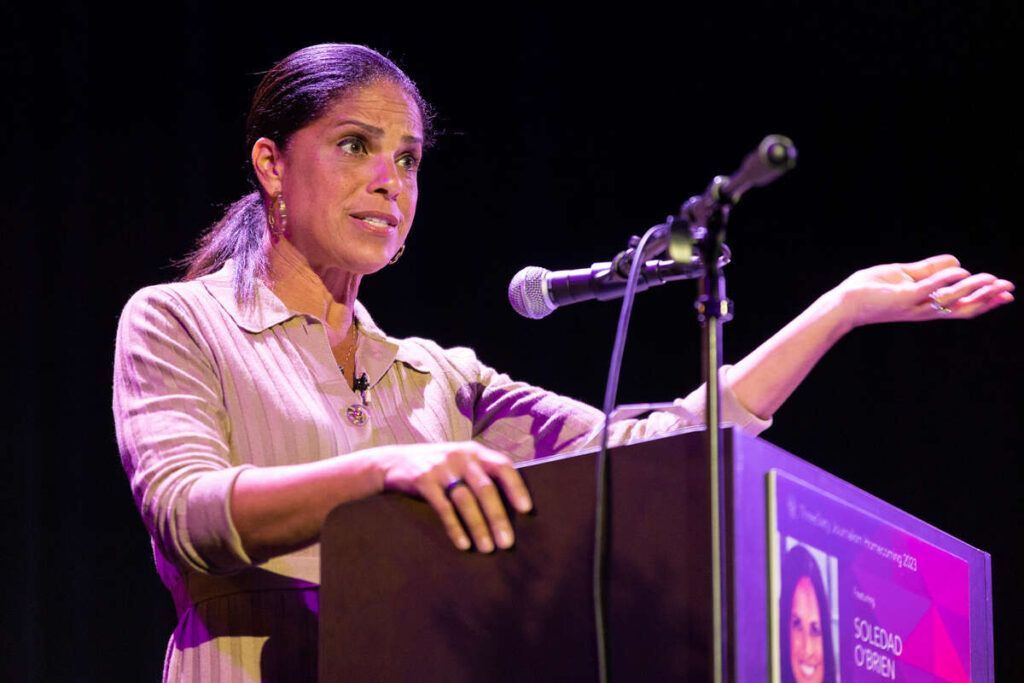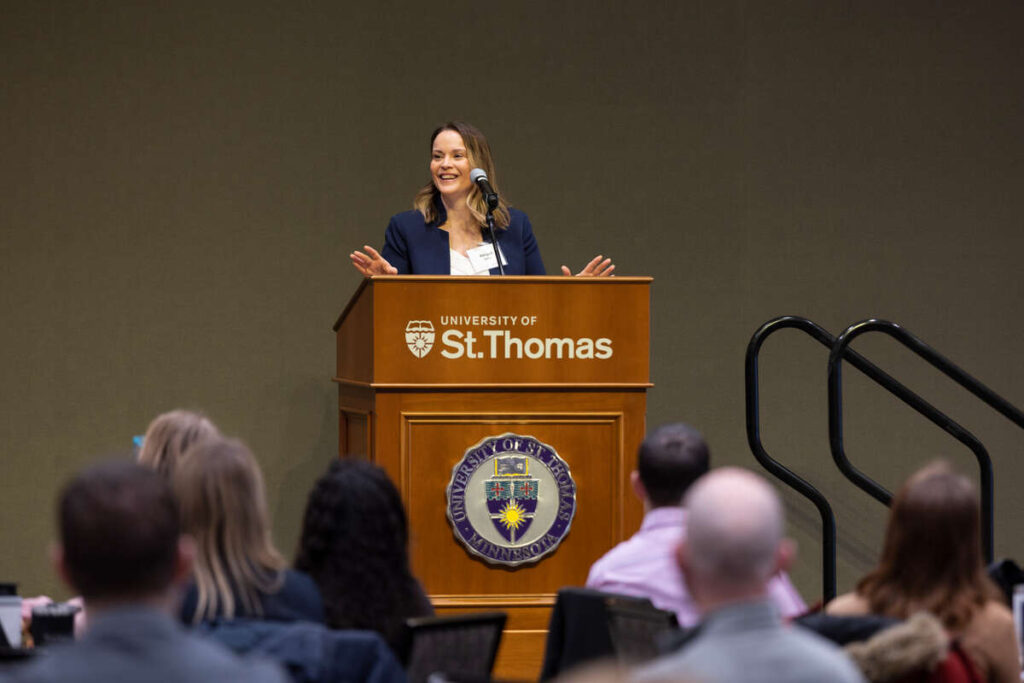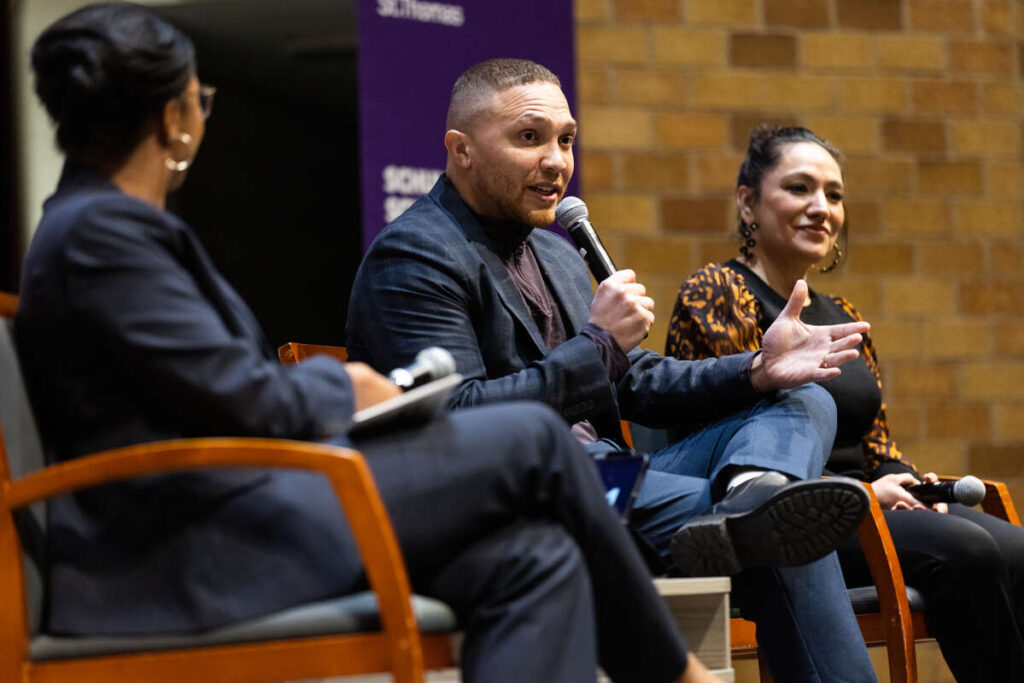Christophe Beck, CEO of Ecolab, joined Dean Don Weinkauf of the St. Thomas School of Engineering on Feb. 5 for the First Friday Speaker Series to discuss advancing the common good, the importance of curiosity, COVID-19 and how diversity, equity and inclusion drives success.
Here are five observations from the conversation.
In the toughest moments, we grow the most
Recalling his academic years, Beck shared that he failed his very first exam and disappointed his parents throughout college. Rebounding from the failure, by the end of graduate school, the engineering major was nearly top of his class.
“It was a very good experience for me. [A]ll those moments ultimately made me grow [and] made me better. This is true for an organization as well,” he said.
Understanding that strength grows out of challenges is an idea that has driven Beck and his impact at Ecolab. He became CEO in January of this year, and prior to that was Ecolab’s president and chief operating officer.
When COVID-19 hit, Beck explained that the company came together and saw they had two options; to help shape history or to be shaped by history.
Deciding to take action, Beck explained, “If there was a moment we could truly make a difference, [COVID-19] was the moment.”
With an array of ways to make a difference, Ecolab looked at themes such as water, food, climate, health, society and their stakeholders to drive their next steps.
At Ecolab, Beck explained 45,000 employees are “serving and supporting 3 million customers in 172 countries around the world.”
With 97 years of success advancing the common good and making macro-scaled change, Beck said that through crises such as 9/11, financial crises and COVID-19, “Every time the company became stronger and went to the next level.”
We need to focus on solving the world's biggest problems
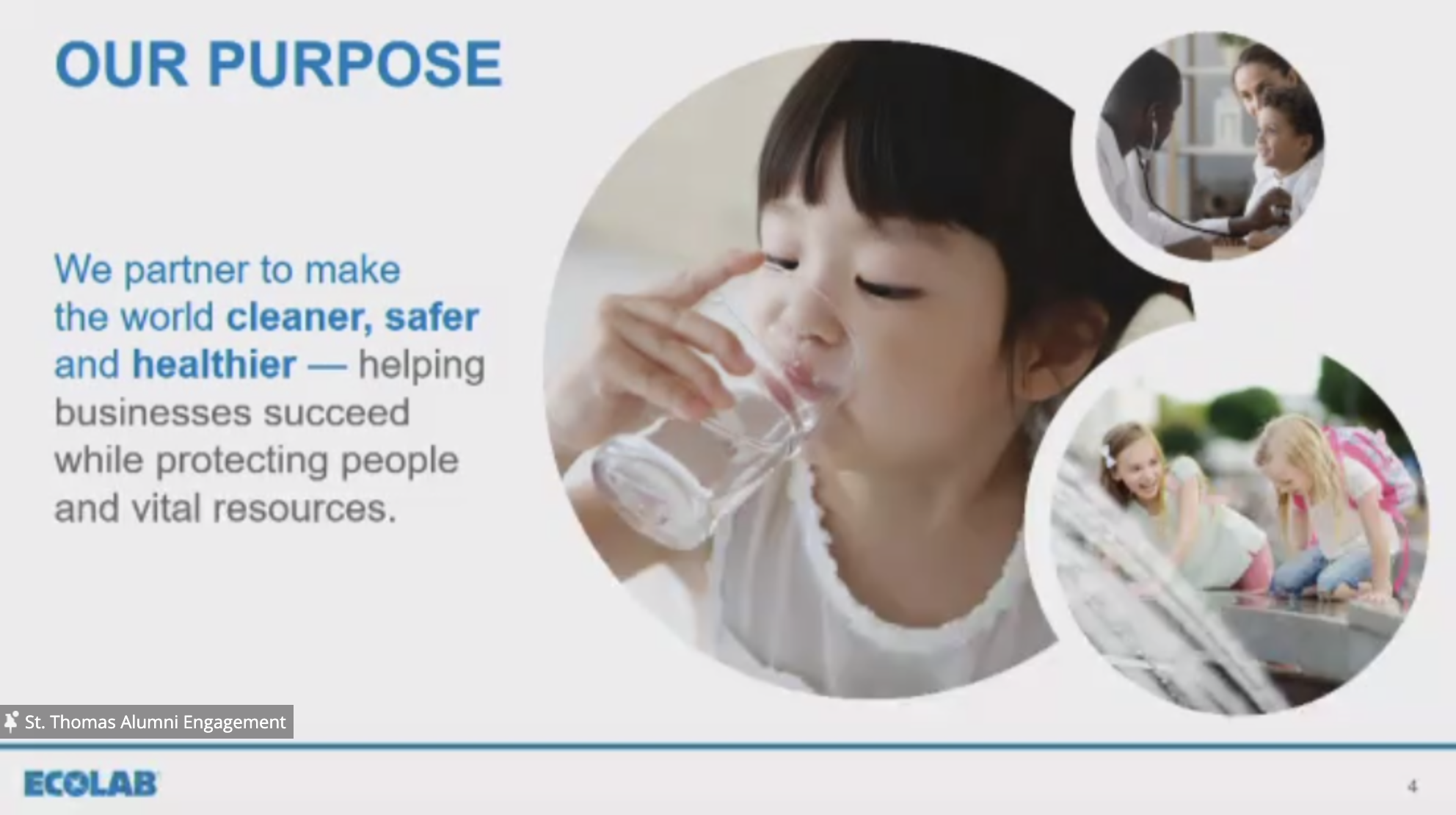 In 2030, the population will require 56% more water, he said.
In 2030, the population will require 56% more water, he said.
“If you put all the drinking water together in a bubble, that would be a bubble 50 miles wide. This is nothing. This is all we’ve got,” Beck remarked.
Beck also discussed issues such as future food shortages, global temperature increases and public health troubles. He said Ecolab continues to support society as a whole, while continuing to be a role model as they navigate and bring positive change to these issues. Touching over 1 trillion gallons of water for customer safety and 36% of the world’s processed food supply, it is clear the company looks to future challenges to guide their current goals.
Regarding the public health area, Beck acknowledged that Ecolab proudly cleans over 1 billion hands per week.
“We are a global company leading hygiene and infection prevention services and technologies,” he said.
Additionally, Beck noted that Ecolab produces 20% of the world’s power. The company’s goal is to be as close to zero carbon emissions as possible by 2050.
“Being strong in the U.S. is one thing, being able to do that everywhere around the world is another,” said Beck.
These are a few achievements that Ecolab has under its belt.
COVID-19 has shown how high human resilience is
“When I think about what human beings can deliver in difficult times, this is unbelievable,” Beck remarked.
He described that COVID-19 continues to exhibit that the population is able to find way more resilience in the midst of trials than anyone could have predicted.
Looking ahead to future crises, Beck said Ecolab is working to drive research in a way that will be useful for future challenges.
Using COVID-19 as an example, Beck said, “Our fastest kill product against COVID, which is within 15 seconds, is the world record that we brought on the market a few months ago. It was not developed for COVID-19, it was developed for the Norovirus.”
Adapting to global needs, Ecolab realized they could redirect a very similar type of pathogen and bring it home to serve customers for COVID-19 and for future pandemics.
Training organizations to go through crises with as much confidence as they can has helped Ecolab navigate the years of challenges they have endured.
“We really went through COVID-19 with the idea to learn. [It was] saying first, we will make it, we will be okay. When you get into the next crisis, you need a place where you have already seen some of this hardship and you can live it in a better way,” Beck said.
Beck explained it was important to provide Ecolab with a sense of reassurance that they will survive, and they had to know that they would. They provided a roadmap for their team that had the framework, respond, rethink, retool and reignite. Ecolab continues to vow to protect the Ecolab team, customers and the company throughout the pandemic.
There is no contradiction between making money and doing good. Purpose, driving business success and strategy can all be aligned.
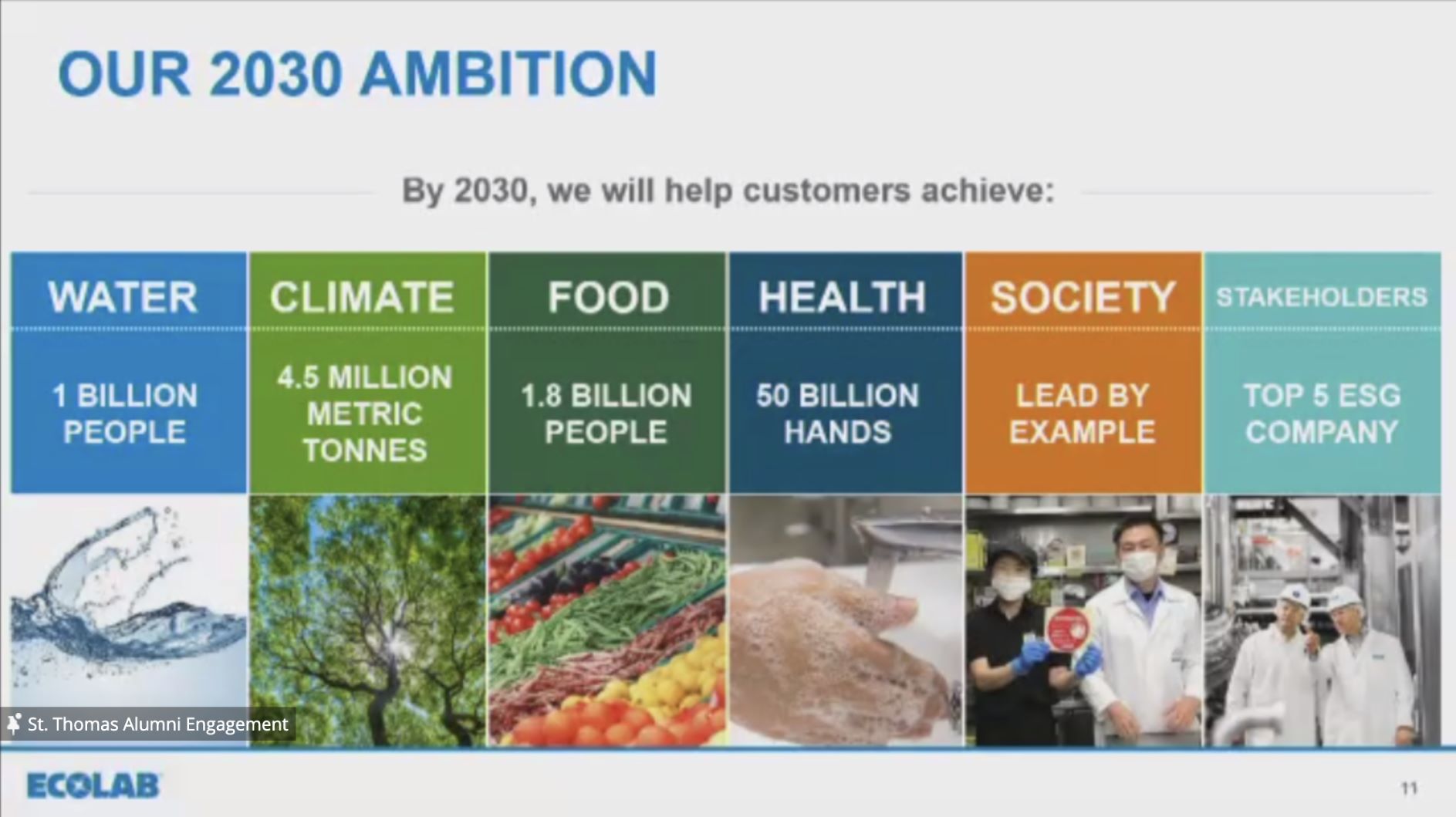 “For us the way we grow is by doing good. The more we help our customers save water, the faster we grow. The more they reduce their carbon footprint, the more we grow. The more people we prevent from infections, the more we grow. Ultimately there is a very natural way to bring doing good and doing well in one aligned approach,” Beck said.
“For us the way we grow is by doing good. The more we help our customers save water, the faster we grow. The more they reduce their carbon footprint, the more we grow. The more people we prevent from infections, the more we grow. Ultimately there is a very natural way to bring doing good and doing well in one aligned approach,” Beck said.
This makes strategizing very easy for the company as every policy they create is aimed at addressing these mountainous world challenges.
By having the future drive the company, Ecolab has found the right focus, he said. This focus has brought them success and influence on these large societal trends.
“The more we do for a customer, the higher the return for that customer. The higher return for them, the higher the return for the environment (and) the higher the return for us. It is a total win, win, win,” he said.
Proving this focus can bring success, Beck stated, “Ecolab has had the chance to be the fourth stock in the world (and has the) most holds by funds, pension firms as well because of what we do, how we do and how we drive performance.”
“We are in a very fortunate place,” he commented.
The next generation needs to stay curious
“I personally believe that the next generation that is in college today is a great generation,” Beck said confidently.
This generation is driven by purpose. They are driving the right way, with the right reason.
“Help them stay curious,” Beck requested.
He continued, “We have been saying for so many years, follow your passion, follow your heart. I don't know if [this is] right. If I think about my own life, I do not think this was the right advice for me.”
Instead, we should be teaching the next generation what is out there and what are all the opportunities.
Using ice cream as an analogy, Beck said, “If the only one you have tried is vanilla, it is hard when someone is asking you, where is your heart? Is it driving you toward a different flavor?”
Having the next generation remain curious will help create new ideas as to how to solve these big problems rather than just talking about them.
Beck carried on, “Learning doesn't end once you end college or grad school. This is something that continues until your very last day in life.”
Driving DEI is the only way to obtain success in the long term.
Beck said Ecolab is striving to have full representation in its workforce, suppliers, customers and more, said Beck. “It starts by us, but it ends with our culture and our values.”
Beck explained that working together with diverse and different perspectives to make change is important.
“From a culture perspective, we’ve been on the journey of diversity, equity and inclusion for a very long time. We have made great progress as an organization, but ultimately when I think about our ambition by 2030 to have full representation, we are not tracking against that. We need to accelerate,” he said.
By defining for every team the objectives in terms of how many women, people of color, etc. they need to hire, Beck says Ecolab will bring diversity to the next level.
“This is, for me, a very important driver for our future success to have all our leaders understand that driving diversity and inclusion in their own team not only is an imperative in terms of business objective, but is the only way that we help them get success for the long term,” he concluded.
